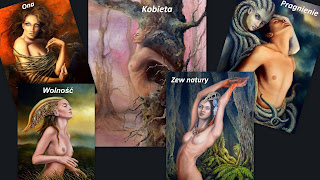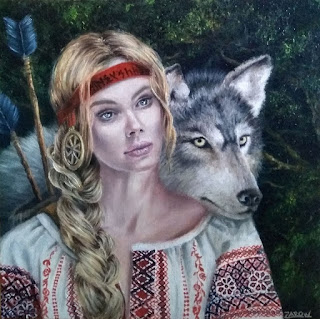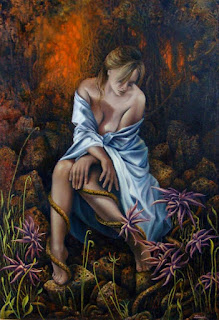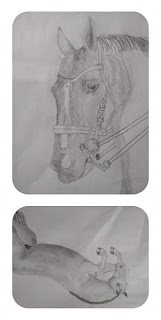[INTERVIEW]
Diana Żarów: Art does not have to be beautiful, art is supposed to move the viewer, trigger emotions, lead to a confrontation with one's own views and ideas.
- April 18, 2021

Here is our guest: wife and mother practicing Art through the great Sz., in which surrealism and magical realism are at the forefront, illustrating the multidimensional beauty of the universe and man. Member of the Association of Visual Artists of the Republic of Poland - painter, Diana Żarów.
Considering this presentation, I would like to start our conversation with the question of how do you see yourself and how do you manage to reconcile the role of an artist assigned by the audience with the role of a full-time wife and mother?
The answer to this question is quite simple: reconciling the roles of mother, wife and artist is possible only thanks to a supportive partner. Apart from dealing with art, I also work professionally, so I have very little time for painting, but I manage to steal it a bit thanks to my husband, who can do everything: cook a two-course dinner, clean up or take care of children. I go to painting plein-airs alone, but it also works the other way around - I take my children on vacation, and my husband becomes a straw widower and recharges his batteries. We also often spend time with the whole family at open-air events and exhibitions. I work a little then, and my husband and children treat such trips as a trip. Our relationship is a partnership and focused on help and support. Thanks to this, we both feel that our home is a refuge to which we want to return.
Maureen Johnson said: "We want to remember, but we also desire to be remembered. That's why we paint." Do you share this opinion, or do you have any other reasons to pursue artistic fulfillment?
To be honest, I don't really know why I paint. Perhaps it is some biological conditioning, a need that is naturally fulfilled? My daughter is passionate about horse riding. When I watch her maniacally draw horses for several hours a day, I don't think she does it because she has a need to leave something behind when she dies. He does it instinctively, naturally, thus expressing his feelings and interests. I guess I have the same. I never thought about where my paintings would end up in a hundred or two hundred years. Man is just a grain of sand in the desert. If I leave these few paintings behind, will it have any meaning for humanity? Probably not, and I don't even have such ambitions. I paint because in this way I express myself, my worldview, moods and emotions. Images allow me to organize the world around me. And if someone identifies with them, reads their or my interpretations in them, then perhaps I touch a common chord with the recipient and we play the same melody. And that's cool.
In what period did the first painting attempts fall and what did they represent? Was the world of colors treated as an antidote to the gray reality that you often had to face?
I sucked my first attempts at drawing with my mother's milk, who has an artistic education. She taught me and corrected me. I drew what I saw around me. Like the cavemen in Lascaux, I described the world with a drawing. So there were animals, nature, but also a mug on the table, a worm digging a mink and a grandmother whose shirt slipped out of her skirt. Later, she reproached me that I could have presented her neater, and that way such a “portrait” would remain in the family.
I took up painting relatively late, only in adulthood. Looking at my paintings, I wouldn't say that the world of colors is an antidote to grey. The colors are often monochromatic, subdued, calm. My work is far from spontaneous colors, but rather subdued.
The time spent on improving your creative skills has significantly expanded them, because although you are known mainly from oil paintings, drawing and watercolor are also familiar...
As I mentioned before, I have been drawing since I was a child. It was an introduction necessary to start the adventure with paints. I don't draw much these days because I express myself in painting. Watercolor works mainly depict floral motifs and I do them quickly, because about an hour. On the other hand, I paint oil paintings for a long time - they are well thought out, planned, with a message and they can tire me out with their laboriousness, unlike watercolors, which are pure relaxation, spontaneity, a little springboard and fun.
Can you tell how many paintings have been created so far? Which are you most proud of and why?
I don't know how many pictures I painted. It's hard for me to even estimate. I don't have a favorite painting because it's yet to be created. If it was like that, then why continue painting? Each fresh painting is my favorite for a few days, and then as I look at it, I like it less and less - and then it's time for a new idea and painting the best one. And then this process repeats itself. That's more or less what it looks like.
Is there one that you would repaint if you could?
If I could, I would repaint all my paintings. I would change or add something in each of them. That is why it is so difficult for an artist to make a decision about finishing work. I have only one way to do it - I just start painting another picture.
When painting, do you follow your mind or your emotions? What is the source of inspiration?
The source of inspiration is, of course, emotions, but due to the fact that my painting is realistic, representational, I also have to put my mind to work. Knowledge, artistic workshop and concept are needed to transfer the vision to the canvas. So both mind and emotion.
Are you able to paint more than before in the times of coronavirus? Or maybe on the contrary - this period is not conducive to creating at all?
For me, life in the era of coronavirus has not changed dramatically. I'm an introvert, so I don't need "noise" around me. I like being at home, in the bosom of nature, I like silence. Paintings are created at a similar pace as before, I do not work remotely, so I did not have time.
When you start work, do you know what the end result will be, or maybe on the contrary - a seed of an idea is formed in your head, which develops on its own in the process?
When I start working on a new painting, I have the general outline and colors in mind. Changes happen during development, often quite large. However, I try to keep the original message.
Which stage of painting is the easiest and which is the most difficult?
The simplest stage is the beginning. Then everything can still happen, I quickly paint the general outline, and the most laborious and tedious is the finishing of the picture. Details, setting the light, where to suppress and what to bring to the fore.
Do your paintings hide your feelings, and if so, can the viewers guess and interpret them correctly?
Yes, my paintings define me and my perception of the world. Without it, it would be rather difficult to create an image. Usually, viewers correctly interpret his message, but there are often surprising connections and receptions. Everyone sees the painting through their own personal experience, so I'm not guiding anyone in the right direction. Everyone finds their own.
Often the subject of your paintings is your female body, but nudity in this edition does not arouse disgust, but delights. Is it difficult not to cross the boundaries of decency and do you set any limits for yourself? Or maybe it's the brush and the pencil that lead the hand without embarrassment?
She delights you, and someone else may annoy or outrage.
I believe that there is no such thing as crossing the borders of decency in art. The creator has the right to see the world in his own way, and imposing decency leads to the degeneration of creative potential. Art does not have to be beautiful, art is supposed to move the viewer, trigger emotions, lead to a confrontation with one's own views and ideas. My paintings may or may not be liked, they may outrage or delight. It all depends on the recipient.

You create, among others, in the current of magical realism. So what is the magic of images based on?
As the name suggests, magical realism allows you to go beyond the mundane. Move the imagination, awaken dreams. I think that most people secretly dream of great love like in the movies, experiencing something amazing, wanting admiration, detachment from the gray everyday life. Therefore, I believe that this trend of art responds to the innate and natural needs of man, to the belief in something greater, which is beyond our reasoning.

The Slavic Dziewanna hugging a wolf also looks from one of your works. Is this manifestation of interest in the subject an unusual return to the roots?
I plan to paint a series of paintings referring to our Slavic roots, showing the symbiosis of man and nature.
I was also drawn to the artwork titled "Poisonous words entwine me like beautiful flowers". Could it be said that you hide messages within your paintings? If so, they seem to be devoid of optimism, or am I mistaken?
Whether the picture is a message - I don't know, I painted it out of the need of the soul, from reflection on the world and man. These are my own thoughts on the position of women in the modern world. We seem to have won our freedom, but still, under the pretext of our good, we are being told how we should live. We are told the perverted duties and responsibilities of a woman. The painting was painted in 2019, and soon after women's protests broke out in Poland. Under the guise of our good, the handcuffs tighten. A few more years and I won't be surprised if we wear burqas...
I know that horses are your great passion. Does riding and interacting with these animals also trigger creative stimuli?

Creative stimuli are liberating in the sense that I commune a lot with nature, with animals. But really horses hone my character. They are huge and strong animals. And also very smart. Man physically has no chance against them, so in order to live in harmony and friendship, one must use intelligence. Horses instinctively sense any human mood, especially fear, nervousness and uncertainty – and they will not hesitate to take advantage of them. You have to be very calm and sure of what you're doing around them. Sitting on a horse, which weighs an average of 600 kilograms, you have to learn to control it, to be its guide. This is not an easy task, because over 80% of people give up riding in the first year of learning.

You have infected your children with your love for horses so much that your less than ten-year-old daughter Lena can draw them beautifully. So can we hope that the girl will also follow in her mother's footsteps by communing with art on a large scale, just like you once did?
I don't have a crystal ball to answer this question. I just hope that she will be fulfilled and happy in life, whatever she does.
In my opinion, contemporary art is paradoxically created to a large extent so that artists can exist, not their works, which is why shocking the recipient is a priority for many, and what goals do you set for yourself and what is your attitude towards fame resulting from recognition in the environment?
People are different, some like to enjoy being an artist and it motivates them, while others create because they have such a need. It's really hard to know what "exist" means. You can exist once and then disappear and not create anything great anymore. Usually, the "existence" of an artist on the art market is a whole, long-term process - it's years of work.
Your painting impresses me, but not everyone has to like everything. How do you take criticism? Are they a motivation to work on yourself and your skills, or rather a cause of depression?
This can be different: it depends on whom such criticism comes from and on its type, because it can be motivating or not. If we are talking about this good criticism, it usually has a depressing effect on me, and then it motivates me. Criticism like: "I don't like it and that's it" doesn't affect me in any way, because not everyone has to like my paintings.
Let your imagination run wild and assume that you have the opportunity to meet your favorite painter and, sipping a cup of coffee with him, present your paintings. Who would you like to show them to?
I have many favorite painters, but I would rather not show my paintings to any of them, because I would rather spend this cup talking about their art.
Painting is a difficult art, but should its value always be measured in international exhibitions and plein-airs? Does less known always mean worse?
Of course, less known does not mean worse. After all, everyone begins by being little known, and some are discovered only after death or not at all.
Where can I see your paintings or where can I buy them?
I keep my exhibitions updated on Facebook. As for purchasing, I have very few paintings available for sale, as around 90% of them are in private collections. It's best to contact me directly so that I can provide information on where a specific artwork can be acquired.
What advice would you give to those who want to start their own colorful adventure with pencil and paints?
Just draw and paint. And what will come out, only time will tell.
You are an excellent proof that painting and literature go hand in hand, because you read a lot, which is why you visit the book blog. Please tell me which literature you most often read and which of the stories you have read so far would you give (apart from the painting album) blindly to everyone and why?
Recently, I read books mainly history, nature and science. I would blindly recommend all of them by Michio Kaku - he is a professor of theoretical physics at the City University in New York and one of the founders of string theory. He writes about astronomy, astrophysics, the conquest of Mars, parallel universes and the future of humanity. This is the perfect book for people who like science fiction and want their heads to swell from contemplation.
The next book is Yuval Noah Harari's Sapiens: A Brief History of Humankind. As for nature books, notable mentions go to Peter Wohlleben's The Hidden Life of Trees and The Secret Life of Nature.
What could I wish you?
Health and loved ones around me.
So that's what I want the most.
In a final word to the readers, I would like to say one more thing…
Do what you love and you will feel happy and fulfilled.
Thank you very much for the time devoted to this nice and important conversation for me.
Diana Żarów was interviewed by Iwona Niezgoda, the initiator and organizer of the independent "Brakująca Litera" (Missing Letter) contest for Polish Book of the Year, and the author of the blog "Góralka Czyta."
Editor in Chief: Barbara Demuth-Garbień
Reportage: Iwona Niezgoda
